Do You Want to be a Zoo Vet? National Zoo Veterinary Externship
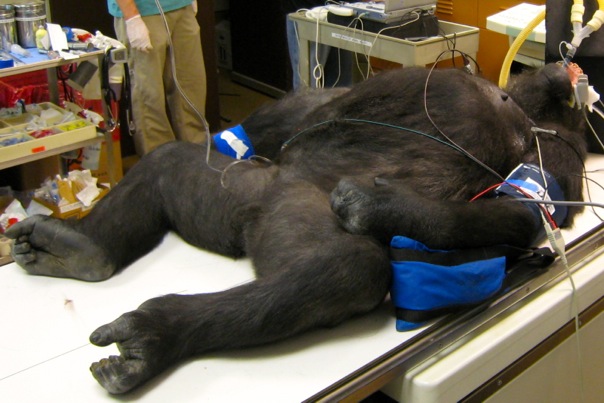
Kwame knew that something was up. He had been trapped alone in an internal holding area between his exhibits, and he didn’t like it. Sure, sometimes this happened and he got rewarded with tasty treats to enjoy all by himself. But those positive experiences didn’t quite erase his suspicions.
Outside the National Zoo’s Great Ape House, Dr. Carlos Sanchez checked his equipment one more time. The dart contained just the right combination of anesthetic drugs. He verified the distance through a tiny window in the door and pictured the dart sailing straight into Kwame’s muscled thigh.
I stood behind Dr. Sanchez in the basement access stairwell, along with another veterinarian, a vet tech, and one of the gorilla keepers. Out of sight on the other side of the exhibit, a third veterinarian and the rest of the keeper staff stood ready. Every medical intervention with these high-profile animals is taken extremely seriously.
Dr. Sanchez pushed the door open, slowly and steadily, and lifted the dart gun up to his eye. Luck was with us so far: Kwame didn’t seem to notice and was still moving warily through his room.
Pfffwoot! And success! The dart had buried itself up to the hub right in the thickest part of Kwame’s gluteus maximus. Within seconds, he reached around and pulled it out, throwing it angrily at the opposite wall. But he was too late.
We stood silently and watched as the teenaged blackback western lowland gorilla started to stagger slightly and then curled up on his side. Another minute and he was completely out, breathing easily and ready for his annual exam.
How does that sound for an afternoon’s work? This was just one of many incredible similar experiences I got to participate in during my six-week veterinary externship at the Smithsonian Institution’s National Zoological Park.
Highlights of the Experience
I was there during one of the female panda Mei Xiang’s potential pregnancies, so this meant observing several ultrasounds and blood draws of what unfortunately turned out to be yet another false alarm.
We did a full work-up at the veterinary hospital on a giant salamander that had stopped eating. I honestly felt like I was in some science-fiction alien movie as we anesthetized and took biopsies from this slippery aquatic beast under the bright lights of the ultra-modern surgical suite.
I was especially proud of myself one early morning when I successfully got a blood sample from one of the feisty and adorable Asian short-clawed otters. Why was I so proud, you might ask? This was after the veterinary resident and vet tech had already tried and failed!
Ultrasounds on elephant joints with an equine radiologist. Enemas and manual fecal extraction of an obstipated gibbon. An echocardiogram with a veterinary cardiologist to evaluate silverback Baraka for early heart failure. Pre-shipment exam on a baby giant aardvark. The list goes on and on.
It was a really cool experience.
So You Want to Be a Zoo Vet?
Zoo veterinarians have one of the most interesting and challenging jobs out there. Sure, most vets get to treat multiple species in the regular course of their work. If we’re honest, though, the vast majority of us spend 99% of our time with only two. Well, make that three, if you count all the human owners we interact with…
I have a t-shirt from vet school that says, “REAL doctors treat more than one species.” A little bitter about being asked one too many times why I didn’t just become a real doctor, maybe?! But I love it. And zoo vets can claim that title more honestly than the rest of us.
Most zoo veterinarians I’ve met and worked with also have a great interest in wildlife conservation, and their zoo jobs often allow them to get involved in field research around the world. Many of them actually transition between these areas quite regularly.
One example of this can be found by looking at the resumes of the last few lead veterinarians for one of my all-time favorite organizations, the Mountain Gorilla Veterinary Project. Most of them have come from zoo jobs and then gone back to that world after a few years traipsing through the jungle in central Africa.
Enough already? You’re convinced?
Well there’s also some bad news. First, the jobs are somewhat few and far between. There are a limited number of quality zoos in the U.S. and around the world, and most of them have only a few veterinarians on staff. Second, it is quite competitive to get accepted into a zoo residency program, even though this means three years of very long hours for very little pay. And finally, the salary you can expect after all these years of training is usually not quite what you could earn as a regular small animal clinician. All that said, you have to really be passionate and disciplined to make this dream a reality.
Setting Up Your Own Zoo Externship
Fortunately for you, getting your own little taste of life as a zoo veterinarian should not be too difficult. There are three great sources of information about available externships (also called preceptorships), and these resources have the links or details you’ll need to submit your applications. The most comprehensive is the list of veterinary externship opportunities from the American College of Zoo Veterinarians (ACZV). The AVMA’s Student Externship Locator also maintains a pretty good list. And the American College of Wildlife Veterinarians also has a page of jobs and training opportunities that are more wildlife-focused.
Due to the demand for these opportunities, you’ll need to plan far in advance and may even have to apply before you know your clinical rotation schedule for third and fourth year. You will also have a hard time finding any way to fund this type of training, outside of your own hard-earned savings or student loan proceeds. It’s possible that you could turn the experience into a research project that might be funded, but this would require some serious creativity on your part.
Almost all of these opportunities are open to veterinary students from around the world. I know of several non-American students who have successfully applied for and completed externships at some of the most competitive zoos.
There are also opportunities for pre-vet students at almost all these zoos. You probably won’t be working closely with the veterinarians, but you can get involved in both the research and animal care side of things. These types of experiences will definitely be appreciated by vet school admissions committees! As an example, here are the National Zoo’s other student internship opportunities.
Back to Kwame’s Story
“Okay, let’s move!” Dr. Sanchez’s words set the team in action, and within minutes Kwame was strapped to a stretcher and being carried out another entrance to a waiting vehicle for his short trip to the veterinary hospital. I sat in the back, monitoring his vital signs while peering out the tinted rear windows of the custom-designed ambulance.
I used to be one of those kids, I thought. The awe and wonder was clear on their faces as they watched us go by. And now I’m the one on the inside, doing my little part to keep these amazing animals around for the next generation.
It was just a brief taste, and now I’ve been out of that world for a few years again. Will I make it back on the inside? That remains to be seen.
Have you had any experiences where you felt, “This is what I was made to do!” What are you willing to sacrifice to make it happen?
[google-map-v3 width=”350″ height=”350″ zoom=”6″ maptype=”roadmap” mapalign=”center” directionhint=”false” language=”default” poweredby=”false” maptypecontrol=”true” pancontrol=”true” zoomcontrol=”true” scalecontrol=”true” streetviewcontrol=”true” scrollwheelcontrol=”false” draggable=”true” tiltfourtyfive=”false” addmarkermashupbubble=”false” addmarkermashupbubble=”false” addmarkerlist=”Washington, DC{}animal-shelter-export.png{}#http://www.elliottgarber.com/do-you-want-to-be-a-zoo-vet-national-zoo-veterinary-externship/ National Zoo Veterinary Externship#” bubbleautopan=”true” showbike=”false” showtraffic=”false” showpanoramio=”false”]


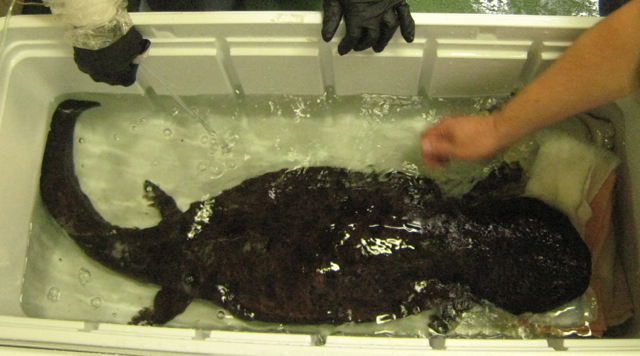
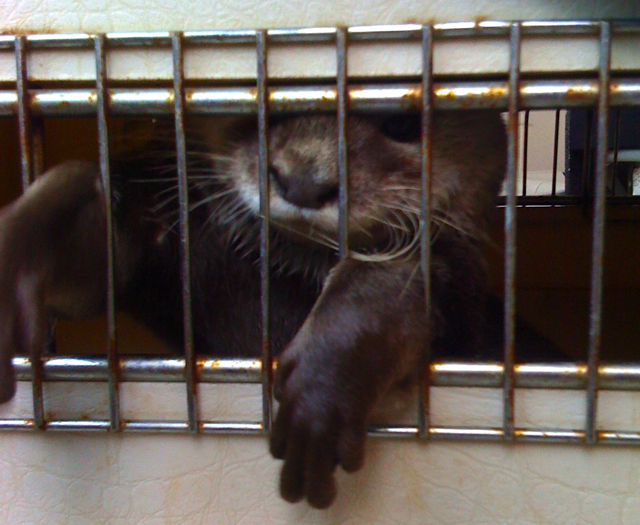
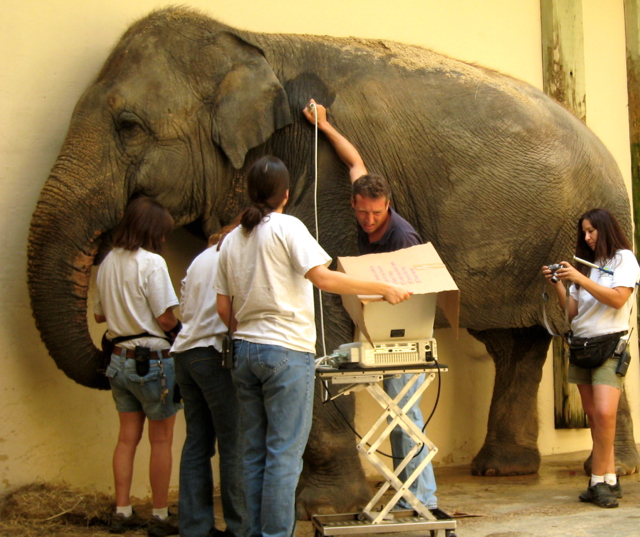
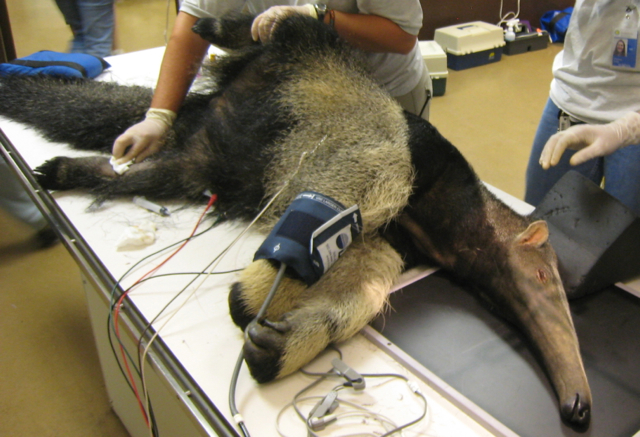
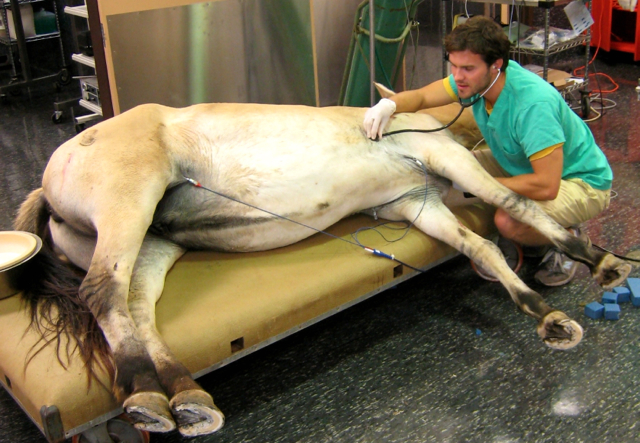
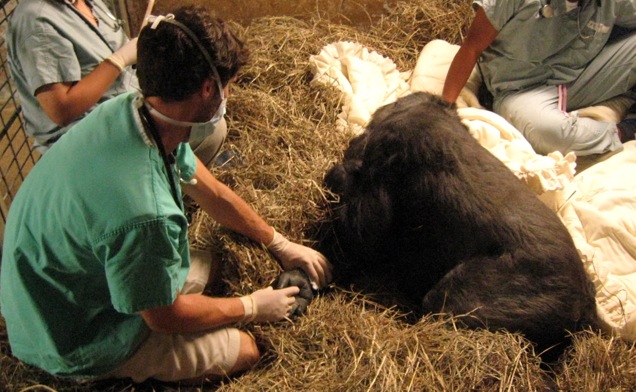
Comments
Wow that looks amazing! I’d love to do something like this – does it have to be in final year? I’m in my second year at RVC in the UK and most places don’t take younger students like me…
I spent a month in Zimbabwe in my gap year working with the wildlife manager at a lion rehabilitation centre, it’s definitely wetted my appetite for more wild animal work! I’ve written a small amount about my experience at my blog –
http://www.coveredincowpoop.blogspot.com
Let me know what you think!
I’ve wanted to be a vet since I was 5 and I still want to be one but I’m only 11 🙁
I want Hey! I’m 10 and I want to be a zoo vet!
I want to be a vet too! I’m only 13.good luck!
Ive been wanting to help animales since i was 6
zoo vet, small animal pet (includes dogs, cats etcetera) farm vet
You’re getting closer, Baylee! It’s a long journey ahead but a fun one!
Hi i am Dr.Dileep kumar i want to job in wild life wellfare.
If any job in zoo or wild life as a doctor then i m redy
THANKS
as the level of B.V.Sc &A.H.
I’m about to graduate in 2 years, I been wanting to work with animals for as long as i can remember, I’m just really worried because I’m not sure what college/university is best for me in order to pursue this dream of mine.
Sophie, thanks for stopping by! I just checked out your blog and loved reading about your time in Zimbabwe. I’ve never gotten to interact that closely with awake big cats, but it’s a definite dream of mine. I think that the veterinary preceptorship at the National Zoo is restricted to final year vet students, but some of their other internships are open to all levels.
Elliott, I’m very interested in being a zoo vet, and I just got accepted into veterinary science at a local school called CTC. My question for you is, how do you get it all started and what is the best advice to try and continue the path I am following into becoming a zoo vet. If you want you can email me at StaciaNichole_2017@hotmail.com
Thanks for the reply and the comments Elliott! I will definitely be investigating these, and saving some of them for the future. I loved my time in Zimbabwe so much, I can’t wait to interact with more wild animals and be part of the conservation effort!
What did you have to do to go to Zimbabwe and interact with the wildlife? I’m just getting appropriate clasess for it but I would like to be prepared.
What a fantastic experience! I’ve still not had much to do with non human primates, but hopefully that day will come. Great pictures btw 🙂
Hi Elliot! I’m currently a pre-vet student at LSU, and I’ve been interested in exotics for a while now. The only experience I have with exotics is interning at a small local zoo in Louisiana, just shadowing the keepers and helping them with their daily duties. Nothing too hands on, but it’s experience with exotics nonetheless, and it was an affirmation that I want to explore past small clinic life. I’m a junior and am currently undergoing the application process for the LSU vet school. I was invited to interview and had that this past Monday. I should find out soon if I get in! I would LOVE to do something similar to this. Do you have any recommendations on how I should get started getting my foot in the door once I do actually get in to vet school? Thank you! I’m eager to explore the rest of your website!
Great to hear from you, Hayley. That’s awesome that you already had an interview! If you get in this year does that mean you’ll start in the fall, or is it some type of early admission program? I think the best ways to ensure you are selected for a good zoo externship are:
1) Prove that you’re serious about this type of career: this could be through your leadership in vet school zoo/exotics clubs, summer experiences involving wildlife or zoo animals, and any other extracurricular experiences you can manage to squeeze in during vet school.
2) Develop relationships with the vets at the zoos you want to do your externships at. This sounds obvious, and it is, but it works. If you know one or more of the vets at a given zoo from some past interaction or work, and you’re otherwise qualified, you should definitely be selected for an externship. Other than summer volunteering or research, a great way to do this is at conferences.
3) Do as well as you can academically. Another obvious one, but important to remember. All that studying really is important! 🙂
Thanks again for your comment and stay in touch!
Thank you for the feedback, Elliot! If I am accepted this application cycle, I will start this Fall. LSU’s vet school allows applicants to apply after three years of undergrad if they are an animal science major. If they are accepted, they’re first year of vet school will count as their final year of undergrad and they receive a degree in animal science as long as a 2.0 is maintained. (So technically, I would graduate on time after 4 years but get to start vet school a year early!) Hopefully everything works out and I will get in this time around! If not, I will just have to try for after my fourth year of undergrad.
LSU is known for a strong exotic/wildlife program. There is also an opportunity that I can apply for after being accepted as Mike the Tiger’s, LSU’s on-campus mascot, caretaker. I’ll definitely have my eye on this position! Only two students are given the opportunity after much consideration, and they care for Mike for a period two years.
I will definitely keep up-to-date on your blog and keep in touch as I make these next big steps toward my career. I appreciate your help and am sure I will seek more of it in the future!
Thank you, Elliott*
I apologize for misspelling your name!
Hi Hayley, and Elliot! I’m Ashley, I just graduated highschool and a week later I got a kennel tech job at my local veterinarian clinic. I have been wanting to be a vet for a long time but I’m not sure how it works/where to start. I’ve read a lot about becoming a vet and I don’t know near as much about it as I do to be a nurse (I’m a CNA.. I was going to do the nursing route but realized it wasn’t for me) I know that you have to have your 4 years of basics and then you apply to vet school right?… I was also considering LSU or A&M but I don’t know all the basics/test scores/grades you have to keep to apply for vet school..
Hi Elliot,
I am a vet student in my third year the UK and am currently looking for zoo externships/internships for my final years. I have applied for the WCS externship based at the Bronx Zoo and I wonder if you have any insight into how this placement would compare to others available to non-American (my school is not AVMA accredited) students, such as the Smithsonian National Zoo internship? Do you know much about the reputation of the Bronx Zoo and/or the WCS? I am having to convince my school why applying abroad would be beneficial (so they can sign off on it), given that there is one externship on offer here in the UK (ZSL) and I’m looking to gather as much detail for persuasion as possible.
Thanks for all the info you share
Hey Lisa, I’m sure I’m too late with my response here! So sorry.
The Bronx Zoo and WCS have great reputations here in the U.S. The zoo is considered to be one of the top places for zoo/wildlife training in the country. The National Zoo is similar — both places have residency programs and have several board-certified vets on staff. Good luck!
Hi Elliott! I’m 15 and would absolutely love to be a vet for exotic animals. The thing is I don’t even have a clue where to start. And I was wondering if maybe you could give me some advice on what I could do to start and maybe some colleges that I should look into for the future? Thank you for your time!
Hey Dallas, that’s great that you’re already thinking ahead about becoming a vet! Fortunately it doesn’t matter too much where you do your undergraduate studies. I would recommend going somewhere that has a strong academic reputation but that doesn’t cost you too much. The four-year veterinary graduate degree is quite expensive already, so it’s best to minimize any student loans you have to take out for your bachelor’s degree.
Here are a couple of links that should help you get started:
http://aavmc.org/Students-Applicants-and-Advisors/Pre-Vet-Student-Resources.aspx
https://www.avma.org/public/Careers/Pages/vet-school-admission-101.aspx
Hi Elliot. I’m from Ecuador and I’m in my final year of veterinary medicine. I like to do my internship in wildlife in the United States. I have a question about the visa. I have a tourist visa but I don´t know if I can do the internship with this kind of visa. I wanted to know if you know what I need to go.
thanks
Hey Nicole, thanks for your question. I actually e-mailed with Dr. Sanchez (mentioned in the post above), because he is somewhat of an expert on this.
Unfortunately no, you can’t do an internship on a tourist visa. If you do an internship in the US you need to get either a J-1 visa or a student visa (F1) but this will depend on where you do the internship. If it is at a school possibly F1 and the school will take care of it, if it’s private organization it will be harder and may need a J1. People are sometimes tempted to overstay a tourist visa and stay for a preceptorship/internship but is NOT recommended because of the risks involved.
I’ll e-mail you personally to give you Dr. Sanchez’s information so that you can get more details from him.
Hi Elliot!
I loved reading about this, i’m currently a senior about to graduate high school & go on to my journey in college. I have an absolute passion for exotic animals! I believe I have no other call in life. I would love to become a zoo vet, but am terrified of tuition & the chance of not finding a job when I graduate. I’m torn between becoming a vet or just studying zoology & getting my masters degree!
Hey Elliot,
Does the Vet Tech or Veterinarian work with the animals on anesthetics as well as not on anesthetics? I was wondering because I’m debating on small animal or zoo vet. I really want to be at a zoo and work with and build bonds with unusual animals, it’ll be incredible.
Hi Elliot!
I am a current sophomore at Texas A&M with my major being Biomedical Sciences: Pre-Veterinary
I’ve always wanted to work with zoo animals, by that I mean extreme exotics. They have always fascinated me because they are so diverse, and they are so amazing. Their science is so different that the normal things I’ve seen, as I have shadowed veterinarians since I was a sophomore; I have only shadowed small animal veterinarians though. This shadowing has actually shown me that I want to specialize in something more, this being zoological medicine.
I was wondering if there are any programs you know about that I could get into this early in the game? Being that I am only in undergraduate studies?
Dr. Carlos Sanchez is another reason I want to go into zoological medicine- just listening to his stories has made me start chomping on the bits to get started! I was wondering if you knew a way I could get in contact with him? His email? I understand if you can’t give that out- just wondering!
I’m not sure yet if I want to work in a zoo or something else completely. I love the idea of traveling to Africa and working there for awhile- actually it’s one of those far off dreams for me! Do you have any suggestions?
Thank you so much!
Alexis
Hello Elliot!
I just came across this article as I’m currently doing an essay on veterinary practice in exotic animals. This has always been a huge interest of mine & I found your write up very informative. I am currently going to school to become a VOA which is my starting point .. eventually I would love to become an undercover animal investigator. I was wondering if you could recommend any reputable Canadian agencies that deal with either exotics or farm animals?
I appreciate your feedback!
Thanks!
I am 16 and have wanted to be a vet my entire life. I grew up on a farm in California and now live on another in oklahoma. Since I have two years until college I have to begin thinking about what exactly I want to do. I think being in a zoo would be really cool and I am thinking about working in a zoo even if I’m just the person who feeds them or cleans up after them, but there are perks in becoming a normal vet. I think I want to do this because I will be able to work with a range of animals and not have to be in a place with tons of people. (I get claustrophobic in crouds sometimes) I have also considered specializing in equine. I love horses more than any other animal and am in the process of training a draft horse of mine to compete in dressage.
So I just wanted to share what I’ve been thinking about, there are so many things I want to do and I have trouble figure out what I want most.
Hi, my name is Rachael and I have wanted to be a zoo vet for quite some time now and am very glad to be able to e-mail you.
I was wondering if you would be interested in being interviewed about your job? The interview is 12 questions and is a project for my college study skills class and can be done over e-mail.
Hi there Elliott!
Well I’ve been wanting to be a zoo Vet ever since I was 7 and I just totally loved this article.
Right now I’m 17 and in my last year of Highschool in Puerto Rico. And I’d just like to know what would be the best advice you could give me.
You see, I could get over here my bachelor’s in Biology and then go to Santo Domingo or study in the states in a binary program and get my Bachelor’s and Doctorates degree in 7 years.
What should I do???????
Hi, Im Hannah and i’m bery very interested in becoming a zoo veternarian, it just hit me one day in my personal finance class that I want to help animals in the best way possible. I love elephants and big cats like tigers and lions and all zoo animals really and have always wanted to work with them. I’m in my senior year of high school and applied at a college already to major in Pre-Vet, and i know Grad school comes after that, but I’m nervous about going into this because i know its conpetitive, and i just really want to do this. It’d be great if you could email me at hannahmesecher@gmail.com . I’d love to talk to someone about this. Thanks so much!
I really want to be a zoo veterinarian. Im 18 getting out of highschool. I want to go to college for this even if it takes 4 years and i am getting a job cutting hair for now, until i am done with college and can become a zoo veterinarian. If you cluld give me any advice on what i should do to become this. I love animals with all my heart and i believe this is what i will love
that is so cool!!!
I want to become a vet ever since I was 5 but school is crazy if your a freshman in high school
i love to work in a zoo or wildlife , im 4th year vet student and im waiting for your response how will i get internship in summer at that zoo?